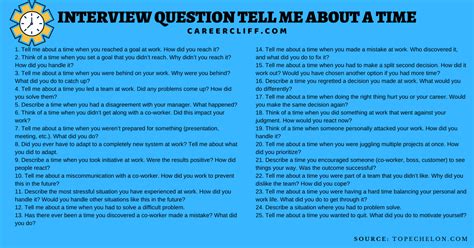Tell Me About A Time You Made A Mistake: A Guide To Answering The Common Interview Question

Interviews can be nerve-wracking. You’re trying to impress your potential employer while also being truthful about your skills and experiences. One question that often comes up is “Tell me about a time you made a mistake.” This question can be tricky to answer, but it’s important to show your interviewer that you’re able to take responsibility for your actions and learn from your mistakes. In this guide, we’ll walk you through how to answer this question and provide some tips to help you prepare.
What the Interviewer Wants to Know
The “tell me about a time you made a mistake” question is designed to see how you react under pressure and how you handle difficult situations. The interviewer wants to know:
- How you recognize and admit to your mistakes
- How you take ownership of your mistakes
- How you learn from your mistakes and use them to improve
How to Prepare for the Question
It’s important to prepare for this question ahead of time so that you don’t get caught off guard during the interview. Here are some steps you can take:
- Think of a specific example: Choose a mistake that you made in a professional setting that you’re comfortable discussing.
- Analyze the mistake: Consider what happened, why it happened, and what you could have done differently to prevent it.
- Identify what you learned: Reflect on what you learned from the mistake and how you’ve used that knowledge to improve.
- Practice your response: Practice telling the story of your mistake, focusing on what you learned and how you’ve grown from the experience.
Structuring Your Answer
When answering this question, it’s important to structure your response in a clear and concise way. Here’s a helpful outline:
Introduction
Start by briefly introducing the situation and the mistake you made. Be honest and take ownership of your actions.
The Mistake
Explain what happened and why it was a mistake. Be specific and focus on the details of the situation.
The Consequences
Discuss the consequences of your mistake, both for yourself and for the company. This shows that you understand the impact of your actions.
The Solution
Explain how you addressed the mistake and what steps you took to prevent it from happening again. This shows that you’re proactive and willing to take action to improve.
The Learning Experience
Reflect on what you learned from the mistake and how you’ve used that knowledge to grow and develop. This shows that you’re able to learn from your mistakes and use them to improve.
Example Answer:
Here’s an example of how you could structure your answer to the “tell me about a time you made a mistake” question:
Introduction:
While working on a project for XYZ Company, I made a mistake that ended up costing the company time and money.
The Mistake:
I was in charge of coordinating with the vendor to ensure that we received the materials we needed on time. However, I misread the delivery date and didn’t realize that we needed to place the order earlier than I had originally thought.
The Consequences:
As a result, the vendor wasn’t able to deliver the materials on time, which caused delays in the project and led to additional costs for the company.
The Solution:
Once I realized my mistake, I immediately contacted the vendor to see if there was anything we could do to expedite the delivery. Unfortunately, it was too late to make any changes, so I worked with my team to come up with a new plan that would minimize the delays and keep the project on track.
The Learning Experience:
This experience taught me the importance of double-checking all of the details and not assuming anything. Since then, I’ve made a conscious effort to be more detail-oriented and to communicate more effectively with my team and vendors to prevent similar mistakes from happening in the future.
Conclusion
Answering the “tell me about a time you made a mistake” question can be challenging, but it’s important to show your interviewer that you’re able to take responsibility for your actions and learn from your mistakes. By following the steps outlined in this guide, you can prepare a thoughtful and effective response that highlights your strengths and demonstrates your ability to grow and develop as a professional.
FAQs
Q: What if I can’t think of a mistake to talk about?
A: If you can’t think of a mistake you’ve made in a professional setting, think about a mistake you’ve made in another area of your life, such as school or a personal project. The key is to choose a mistake that you’re comfortable discussing and that demonstrates your ability to learn and grow.
Q: Should I choose a mistake that was minor or a major mistake?
A: You should choose a mistake that was significant enough to demonstrate your ability to take responsibility for your actions and learn from your mistakes. However, you don’t want to choose a mistake that was so major that it reflects poorly on your judgment or professionalism.
Q: What if I’m still not sure how to answer the question?
A: Consider reaching out to a career coach or mentor for guidance. They can help you identify a mistake to talk about and provide feedback on your response.
